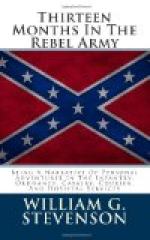I may as well record at this point what I know of the moral and religious efforts put forth in the South in behalf of the soldiers, and the effect of the Rebellion on the educational and religious interests of the people generally. As a general truth, when the recruits first came to the army, those with religious inclinations or who had pious friends, brought along a Bible or Testament, but these were in most cases soon lost or left behind, and the camps were almost destitute of any good books. Religious publications were not distributed to the soldiers except in the hospitals, and to a very limited extent there. The regiments composed of Irish or French Catholics, usually had a priest as chaplain; but I saw very few of the Protestant chaplains who gave themselves up to the spiritual care of their men. We had a good many ministers in the army of the Mississippi valley, but they almost all held a commission of a military, rather than a religious kind, and so far as I could judge, were fonder of warlike than of heavenly ministrations. In the hospital at Nashville, on the other hand, good men and women endeavored faithfully to present the truths of the Bible and the consolations of religion to the attention of the inmates. But, as I have hinted, the army was not much benefited by the clerical members attached to it, though their loss may have been felt by the churches they had forsaken. There were but few of what are called Gospel sermons, preached in the army anywhere within my reach during my soldier life. As a consequence of the inherently demoralizing effect of war, and this great destitution of conserving influences, vice reigned almost unrestrained in the army. The few good and devout men, and the infrequent prayer-meetings which were held, seemed powerless to restrain the downward tendency of morals. Profanity, the most revolting and dreadful, abounded, though contrary to the Articles of War, and many of the officers were proficient in this vice. Gambling, in all the forms possible among soldiers, was the main amusement on the Sabbath-day. These were the prominent vices, and, if possible, they were growing more and more monstrous continually.
As for the effect of the war upon the country generally, I can not give many facts, though I had some opportunity of observation, as will be seen. Preaching was maintained in most of the churches in the large cities; but in many of the smaller places, and in country churches, service was suspended. This was true so far as my observation reached, and it must have been so in other places, from the fact that so great a proportion of the men were engaged in the war. And even where preaching was kept up, every sermon I heard was embellished and concluded by a grand flourish, about the duty of praying and fighting for their homes and institutions. This universally belligerent spirit was evidently unfavorable to the progress of true and consistent piety. Schools and seminaries of learning were chiefly closed, and they were not very abundant before. In fine, I think if this Rebellion continues a year or two longer, the South will be a moral wilderness.




